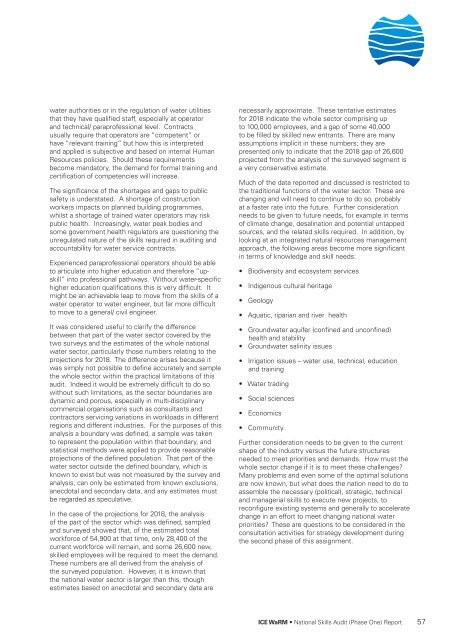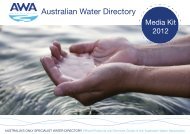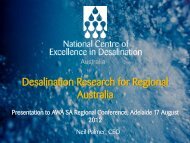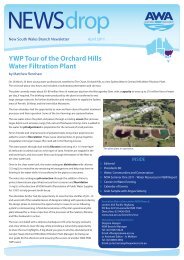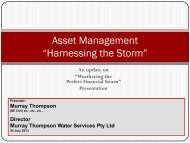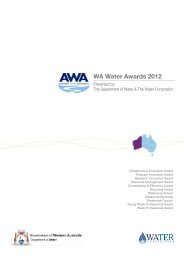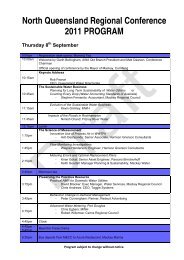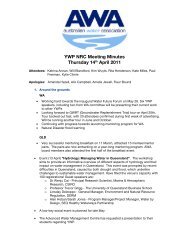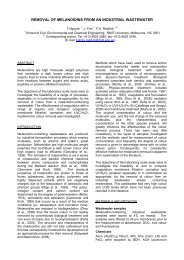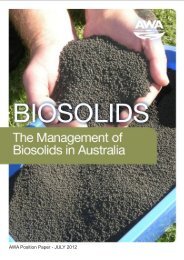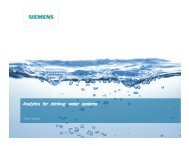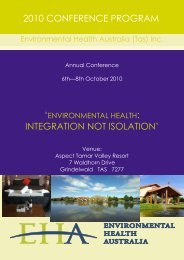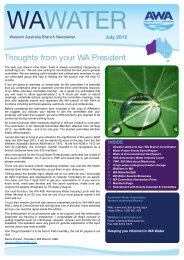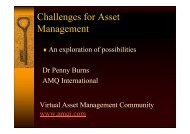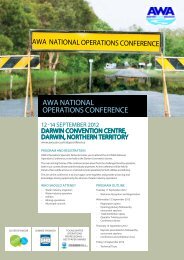National Water Skills Audit - Australian Water Association
National Water Skills Audit - Australian Water Association
National Water Skills Audit - Australian Water Association
- No tags were found...
Create successful ePaper yourself
Turn your PDF publications into a flip-book with our unique Google optimized e-Paper software.
water authorities or in the regulation of water utilitiesthat they have qualified staff, especially at operatorand technical/ paraprofessional level. Contractsusually require that operators are “competent” orhave “relevant training” but how this is interpretedand applied is subjective and based on internal HumanResources policies. Should these requirementsbecome mandatory, the demand for formal training andcertification of competencies will increase.The significance of the shortages and gaps to publicsafety is understated. A shortage of constructionworkers impacts on planned building programmes,whilst a shortage of trained water operators may riskpublic health. Increasingly, water peak bodies andsome government health regulators are questioning theunregulated nature of the skills required in auditing andaccountability for water service contracts.Experienced paraprofessional operators should be ableto articulate into higher education and therefore “upskill”into professional pathways. Without water-specifichigher education qualifications this is very difficult. Itmight be an achievable leap to move from the skills of awater operator to water engineer, but far more difficultto move to a general/ civil engineer.It was considered useful to clarify the differencebetween that part of the water sector covered by thetwo surveys and the estimates of the whole nationalwater sector, particularly those numbers relating to theprojections for 2018. The difference arises because itwas simply not possible to define accurately and samplethe whole sector within the practical limitations of thisaudit. Indeed it would be extremely difficult to do sowithout such limitations, as the sector boundaries aredynamic and porous, especially in multi-disciplinarycommercial organisations such as consultants andcontractors servicing variations in workloads in differentregions and different industries. For the purposes of thisanalysis a boundary was defined, a sample was takento represent the population within that boundary, andstatistical methods were applied to provide reasonableprojections of the defined population. That part of thewater sector outside the defined boundary, which isknown to exist but was not measured by the survey andanalysis, can only be estimated from known exclusions,anecdotal and secondary data, and any estimates mustbe regarded as speculative.In the case of the projections for 2018, the analysisof the part of the sector which was defined, sampledand surveyed showed that, of the estimated totalworkforce of 54,900 at that time, only 28,400 of thecurrent workforce will remain, and some 26,600 new,skilled employees will be required to meet the demand.These numbers are all derived from the analysis ofthe surveyed population. However, it is known thatthe national water sector is larger than this, thoughestimates based on anecdotal and secondary data arenecessarily approximate. These tentative estimatesfor 2018 indicate the whole sector comprising upto 100,000 employees, and a gap of some 40,000to be filled by skilled new entrants. There are manyassumptions implicit in these numbers; they arepresented only to indicate that the 2018 gap of 26,600projected from the analysis of the surveyed segment isa very conservative estimate.Much of the data reported and discussed is restricted tothe traditional functions of the water sector. These arechanging and will need to continue to do so, probablyat a faster rate into the future. Further considerationneeds to be given to future needs, for example in termsof climate change, desalination and potential untappedsources, and the related skills required. In addition, bylooking at an integrated natural resources managementapproach, the following areas become more significantin terms of knowledge and skill needs:• Biodiversity and ecosystem services• Indigenous cultural heritage• Geology• Aquatic, riparian and river health• Groundwater aquifer (confined and unconfined)health and stability• Groundwater salinity issues• Irrigation issues – water use, technical, educationand training• <strong>Water</strong> trading• Social sciences• Economics• Community.Further consideration needs to be given to the currentshape of the industry versus the future structuresneeded to meet priorities and demands. How must thewhole sector change if it is to meet these challenges?Many problems and even some of the optimal solutionsare now known, but what does the nation need to do toassemble the necessary (political), strategic, technicaland managerial skills to execute new projects, toreconfigure existing systems and generally to acceleratechange in an effort to meet changing national waterpriorities? These are questions to be considered in theconsultation activities for strategy development duringthe second phase of this assignment.ICE WaRM • <strong>National</strong> <strong>Skills</strong> <strong>Audit</strong> (Phase One) Report 57


